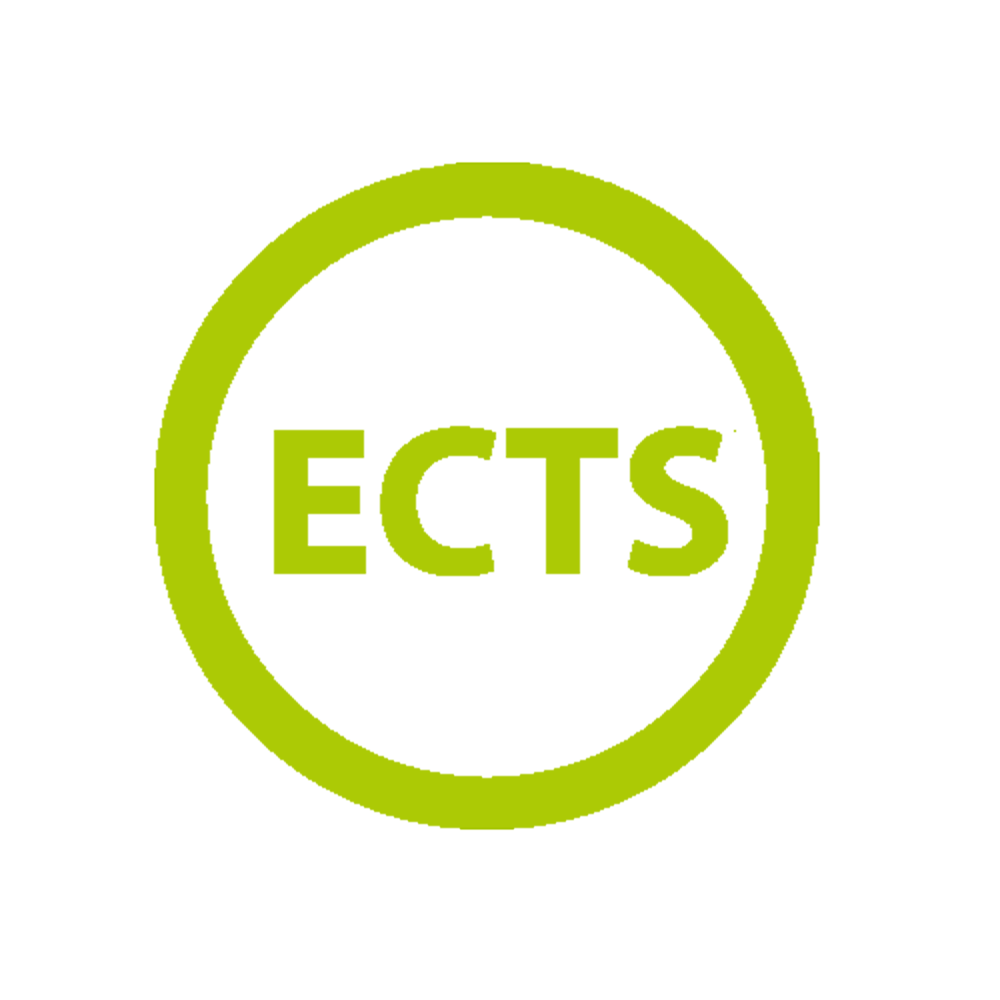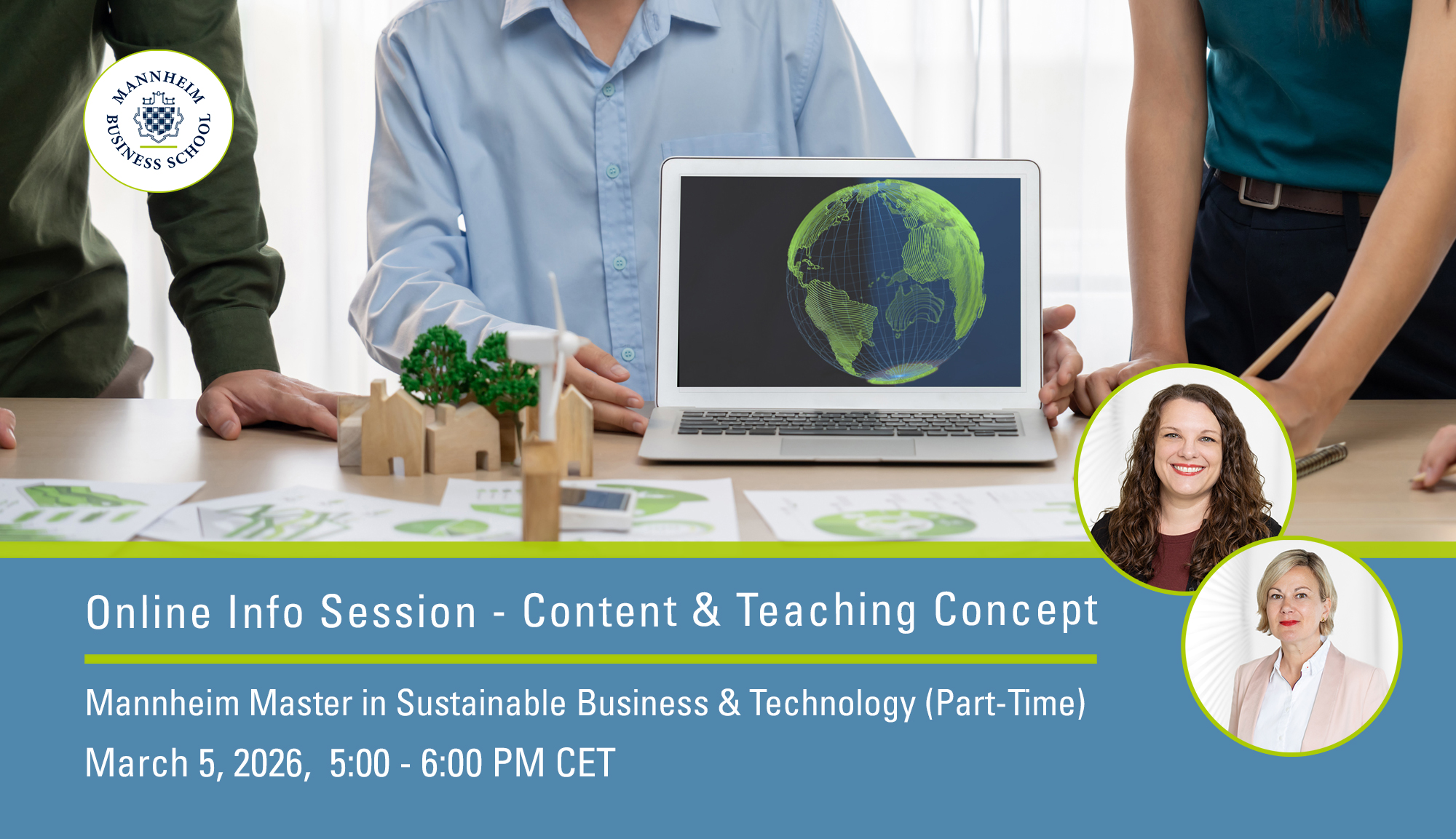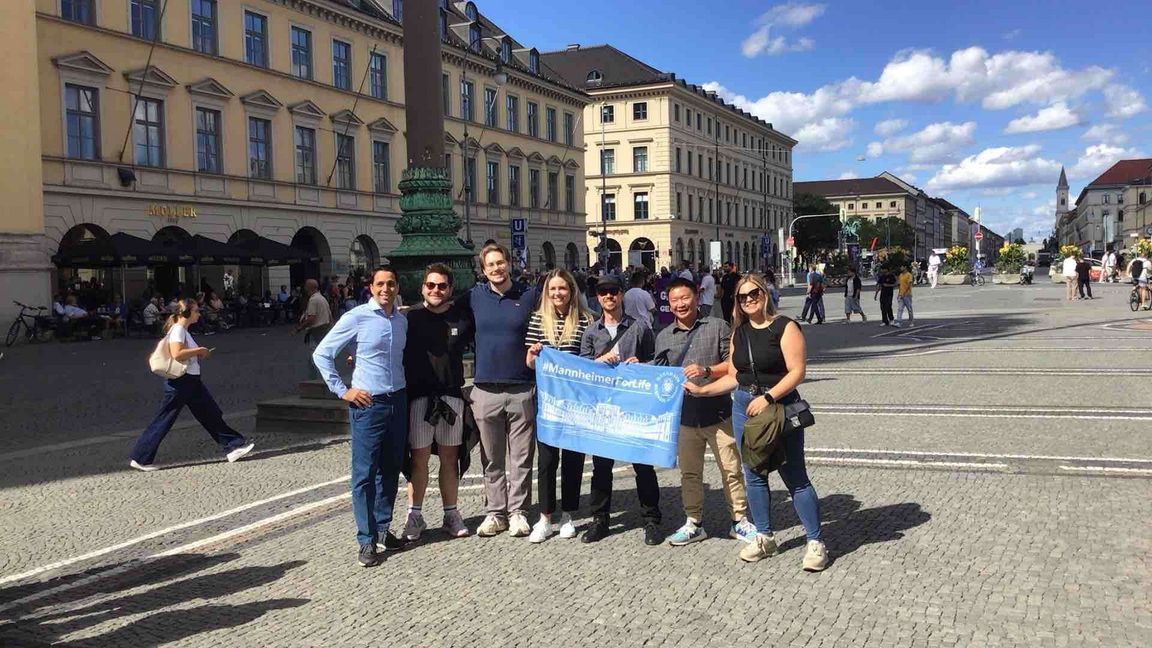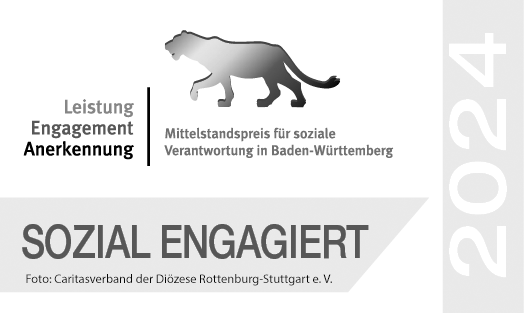Mannheim Master in Sustainable Business & Technology (Part-Time)
You are here: Programs & Courses » Master's Programs » Mannheim Master in Sustainable Business & Technology (Part-Time)
Turn Technology Into Largescale Business Transformation
Companies in every sector are rethinking how they create value in a world shaped by digital technologies, new regulations, and shifting market expectations. The Mannheim Master in Sustainable Business & Technology, Europe’s leading Master‘s program for tech- and value-driven business transformation, prepares you to design and implement this transformation – from boardroom strategy to concrete business models and operations.
Over 24 months, you will learn how to turn technologies such as AI, data analytics, and smart infrastructure into competitive advantage, manage complex change initiatives, and navigate the financial and regulatory implications of these shifts – for a sustainable future.
Connect with us!
What You Will Learn
The Mannheim Master in Sustainable Business & Technology is aimed at young professionals who want to take on decision making roles in corporate and industry transformation. This program prepares you to become a shaper of industrywide change – in positions where you design, evaluate, and execute transformation end-to-end. The program will give you a strategic management toolkit for large-scale transformation. You will learn how to:
Design data-driven strategies that reshape value chains, production systems, and business portfolios to adapt to market and regulatory dynamics in a sustainable and future-ready way.
Use technologies such as AI, IoT, and advanced analytics to redesign operations, supply chains, and energy systems for performance, resilience, and compliance.
Translate regulatory and stakeholder requirements into robust, sustainable business cases and investment decisions.
Lead cross-functional transformation programs and manage the organizational change they require.
Upcoming Information Events
The Mannheim Master in Sustainable Business & Technology at a Glance

Degree
Master of Arts (M.A.) awarded by the University of Mannheim

Duration & Structure
24-month modular part-time format

Admission Requirements
A first degree, first work experience, fluency in English, current employment

Language
100 % English

Program Credits
120 ECTS

Location
Mannheim & study trip to a European business hub

Program Start
Once a year
Next start: May 2026*

Tuition Fee
Current fee €29,900 (regular fee €32,000), Early Bird discounts and partial scholarships available
Voices from the Industry
Your Key Benefits
Gain a comprehensive toolkit that links corporate strategy, technology, finance, and regulation – and apply it directly in your job between modules.
Learn from internationally recognized faculty and industry experts in areas such as AI and data, operations and supply chains, energy and infrastructure, and governance.
Work on real transformation projects and your own Master Project to create visible impact for your company or sector.
Build a diverse, cross-industry network of peers who are all working on the next generation of business models and industrial systems.
Personal Orientation Interview with the MSBT Admissions Manager
To begin your consultation process, please use the Introduce Yourself function: We conduct a pre-check of your profile based on your submitted LinkedIn profile or CV, followed by a Personal Orientation Interview.
Please note that these online consultations will take place during our usual office hours on weekdays. These consultations do not start an application process and do not replace the selection interview.
Career Impact Class of 2025
Participants in the Mannheim Master in Sustainable Business & Technology see clear career progress already during the program:
60% experienced a career development already during their studies and the averager salary increased by more than 30%.
Furthermore 25% work in roles at the interface with data and analytics.
Curriculum: From Strategy Design to Implementation
The curriculum connects foundations of management and regulation with innovation, technology, and transformation. You progress from modules on corporate strategy, markets, and governance to courses on AI & big data, advanced operations and supply chains, new infrastructure systems, and investment and financing decisions. This structure enables you to understand both the economic logic and the technological backbone of tomorrow’s business and industry landscapes. Find the complete program overview here.
Immersive Study Trip to a European Business Hub
The study trip is an integral part of the Mannheim Master in Sustainable Business & Technology and takes your learning beyond the classroom. Together with your peers, you will spend several days at a leading business school in a European business hub, dive into a mandatory course on transformation-related topics, and gain firsthand insights into how companies and ecosystems are evolving there. Accommodation is included, so you can fully focus on learning, networking, and exploring the local business environment with your cohort.
Tuition Fees
The regular tuition fee for the Mannheim Master in Sustainable Business & Technology is €32,000. For the first intake, we offer an introductory price of €29,900.
If you prefer, you can spread the fee over 24 monthly installments of €1,120.84.* An initial payment of €3,000 is due within 14 days of signing the contract.
*Monthly installments are available for participants with a permanent employment contract in the European Union. Other payment options are possible – please contact Ms. Gold for details.
Your tuition includes full access to the Mannheim Business School IT infrastructure (including WiFi and intranet), the library and databases, as well as the sports facilities of the University of Mannheim. Travel and accommodation costs are not included. The application fee of €99 is nonrefundable.
Scholarships
Mannheim Business School offers partial scholarships of €1,000–€3,000 for successful, self-funded applicants. You can improve your chances by applying early.
Awarded to applicants with an excellent academic and professional record, strong English skills, foreign language abilities, and/or clear social engagement, as demonstrated throughout the selection process.
To support diverse cohorts and networks, the first five admitted applicants from distinctive industries receive a €1,000 scholarship. It is automatically credited towards the tuition fee, can be combined with the Early Bird discount, and does not require a separate application.
This scholarship emphasizes Mannheim Business School’s commitment to increase the number of women in executive positions. Any woman with a proven track record of outstanding achievements in her professional life or social commitments can apply for this scholarship.
Frequently Asked Questions
Find answers to commonly-asked questions about the program here.
Contact


Downloads
- Mannheim Master in Sustainable Business & Technology (Part-Time) Sample Schedule
- Mannheim Master in Sustainable Business & Technology (Part-Time) Payment Information
- Mannheim Master in Sustainable Business & Technology (Part-Time) Factsheet
- Mannheim Master in Sustainable Business & Technology (Part-Time) Tax Tip
- Mannheim Master in Sustainable Business & Technology (Part-Time) Examination Regulations/Prüfungsordnung DE













